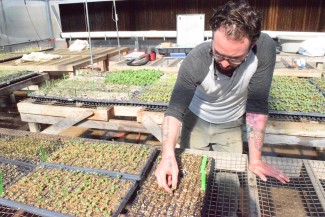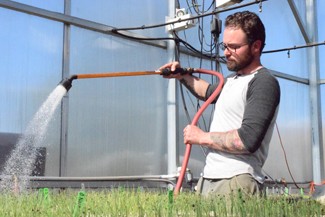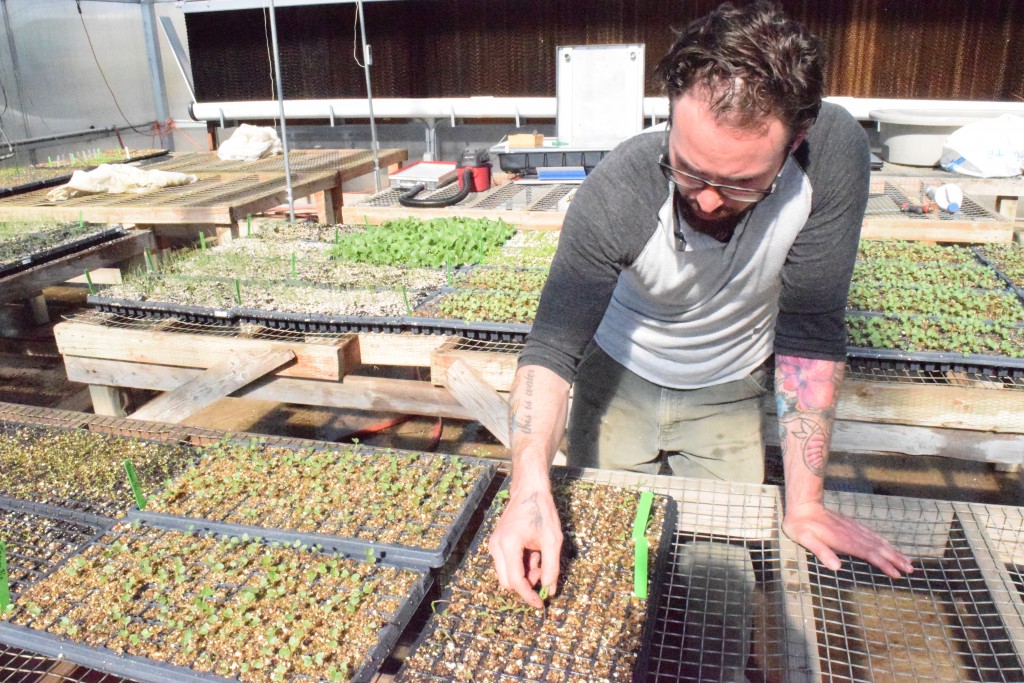Organic farmer branched off from previous life of music
Adam Reed picked up a pair of drumsticks in the fifth grade and played for approximately two decades, but he doesn’t have much time to tend to his kit these days.
Instead, Reed focuses his energy on the mice eating his tomato seeds, costing him hundreds in lost capital. Ten years ago when he was a musician, he never imagined he would have to resolve an issue like this.

Jake Smith | Argonaut
Adam Reed, a local organic farmer, works in his 200 square-foot greenhouse two miles from Moscow. Reed provides safe, sustainable, organic vegetables for local restaurants.
Reed, a local organic farmer, said it wasn’t long ago his life took a 180-degree turn. He said everything fell into formation while reading “East of Eden” by John Steinbeck — the book that helped him decide to move west and start farming.
“I joke about (how) four or five years ago I was living in Chicago and was a vegetarian,” Reed said. “I didn’t have a car. I was riding my bike everywhere. I was working in a restaurant, playing in a band. Now I’m living in Idaho. I’m driving a truck. I have a dog. I have a farm. I laugh about it, because I never really saw it for myself.”
Reed is now the owner of Moscow Urban Farm Company and Victory Farm, although in the past he’s filled a number of different roles — restaurant employee, urban nomad, drummer and vegetarian.
Reed said in his 20s he was afraid to put down roots anywhere, especially being a musician in a “progressive-rock-jazz” band. He didn’t want to buy furniture or have any permanent ties, because he wanted the ability to pick up his life and move at a moment’s notice.
He now owns a 200-square-foot greenhouse, a plot within Moscow city limits and 30 acres of land approximately three miles north of Moscow, he said.
He still works with restaurants to this day, Reed said, but the journey from restaurant employee to vegetable farmer was long and arduous.
Reed said he went to school at Washington State University in 2011 and enrolled in the Organic Agriculture program. As a student, he worked on an organic farm at WSU and over winter he worked on growing plants in greenhouses to market to local restaurants — which he found to be his true passion.
In 2012, after the winter project in the greenhouses, Reed said he obtained half an acre of land in Moscow, where he still farms today. At this point, Reed said he was growing specifically for restaurants.
Reed began selling to the Moscow Food Co-op in 2013 and last year, he started selling in the Moscow Farmer’s Market. Reed obtained a USDA farming loan to buy 30 acres of land north of Moscow in the fall of 2014.
Reed said his newest project, the 30-acre Victory Farm, will be his life’s work. Providing certified organic food for the community is the goal, he said.

Jake Smith | Argonaut
Excluding the greenhouse he works in from time to time, Reed owns two farms. His most recent 30-acre addition, Victory Farm, is named after World-War-II-era victory gardens. Victory Farm is a way for Reed to answer the call against a food war waged by conventional agricultural techniques.
Victory Farm is named after World War II era victory gardens, he said. Reed said people were urged to grow gardens in their backyards to support war efforts. It started to occur to Reed that the posters are still relevant in a different way.
Victory Farm is a way for Reed to respond to a food war waged by conventional agricultural techniques.
“I, personally, feel the conventional, agricultural system is really wreaking havoc on people’s health and the environment,” Reed said. “I feel like I’m embroiled in a little bit of a food war. I’m answering the call.”
Selling produce to restaurants is satisfying, he said, because he gets to see the vegetables he grows treated with care and attention.
Seeing the vegetables on his farms being transformed into a dish is a thrilling experience, he said.
“I get a lot of satisfaction just from knowing that people choose to buy and ingest the things I grow. It’s sort of an intimate thing, when you think about it,” Reed said. “I’m really thankful of that choice, and I get a lot of satisfaction from being able to provide people with that option.”
Reed said he worked with restaurants in Chicago because he was trying to be a musician for so long. Hours and scheduling are flexible at restaurants, which made it easier for him. He said the restaurant industry is conducive to someone pursuing an artistic lifestyle.
“My interest in food, in general, came as a result of working in and with it a lot — it was sort of a natural evolution,” Reed said. “I was a vegetarian for six years. I think that was part of it, when you draw some sort of dietary guideline for what you’re eating. I think the decision to start farming was maybe some sort of byproduct of that decision.”
Reed said being a farmer is stressful and financially difficult to pull off. It requires a huge capital investment, especially with the large-scale farm he’s now attempting to grow, he said.
He said he feels the biggest difficulty is constantly spending money and not making any, especially in the spring when nothing is ready to sell. Contending with pests is another difficulty, as well as the weather.
Despite the hardships, Reed said he finds joy in what he does, and joy comes when he’s able to look back at the end of the day and see that he did something he feels good about.
Reed, a man who had a difficult upbringing with no agricultural background, said a lot of his principles came from farming.
He said he wants to be a steward of the land by using resources wisely to commit to providing a safe, healthy, sustainable food supply for the community.
Broadly, music had a positive, formative impact on Reed as a listener. To this effect, farming was similar. Music was a selfish endeavor, he said, because he wasn’t doing it for anyone else — only himself.
Reed said to a certain extent, farming is also a selfish answer to how to live a meaningful life, but also a way to make an impact on his surroundings.
He said the impact he makes as a farmer is greater than the difference he could make as a musician, so the drumsticks may not be necessary in the near future.
Jake Smith can be reached at [email protected]
